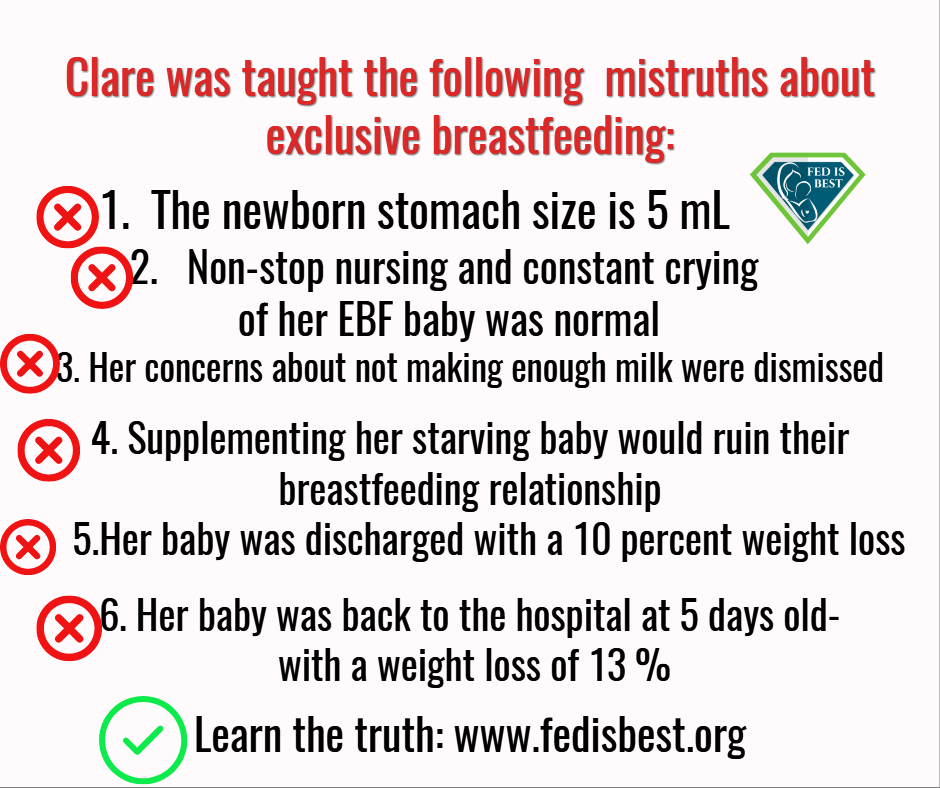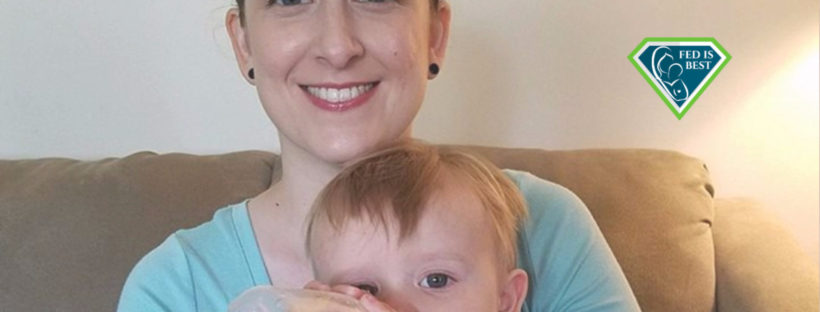Today, after 20 months of combination feeding, I gave my son his last bottle of milkies. I wasn’t able to keep my supply up after I stopped pumping at work. But I feel so proud of myself. 20 months of combo feeding. I made it 20 months!
When my son was born, I expressed concern about possible nursing problems because of my history of hormonal issues—but I was repeatedly dismissed. He lost 10% of his weight in the hospital. I was told that supplementing would basically end my breastfeeding relationship. That it would hurt my supply. I was instructed not to pump. I was told about tiny infant stomach sizes and that the constant crying and nursing was normal. I was told not to worry about insufficient feeding until day five. Well, by day five my son had lost 13% of his weight. That’s when we brought him back to the hospital.

After a weighted feed, we found that my milk hadn’t come in and that I was barely producing any colostrum. My son’s gums and tongue were dry. The nurse admitted he was a day away from hospitalization. She was one of the nurses I called in a panic after we got home. She taught the breastfeeding class and parenting class I attended before my son was born. She visited our room at the hospital several times after the birth. And she simply believed the lie that under supply is rare and that tummy size are tiny. I found out recently that the hospital is still teaching this. That same nurse who, after finally acknowledging my son’s drastic weight loss and recognizing that I actually did have supply issues, developed a triple feeding plan for us. It wasn’t until ten days after my son was born that my milk finally came in.
I was devastated to find out that I couldn’t exclusively breastfeed my son. And I was angry that my risk factors for low supply were ignored. Angry that despite my son’s obvious distress and significant weight loss, my concerns were dismissed. Angry that I was instructed that just one bottle would ruin any chance I had at breastfeeding.
I am now proud that I made it 20 months. 20 long months of combo feeding a child with dairy and soy allergies—despite being told my odds of doing so were pretty much impossible. I shouldn’t be the exception. Women are often told that long-term combination feeding just isn’t possible. It is possible for many of us, but not all of us. I know too many women who—like the Academy of Breastfeeding Medicine is finally acknowledging—believe that one bottle means “the horse is out of the barn” and that they might as well stop breastfeeding. It doesn’t need to be this way.
Sometimes I am asked, “If you truly believe formula is equal to breast milk, then why did you keep nursing despite your struggles?” To that I say, it’s what I wanted to do; it’s something I love doing. And that is good enough. I don’t need everyone to be exactly like me and to find meaning in what I love. I don’t need to feel superior. I don’t need to justify why I continued to nurse by denigrating someone else’s decision or inability to not do the same. One does not cheapen the other. Fed is best!
To learn how to prevent newborn feeding complications, please go to the following:
- Resources for Parents – information on how to supplement while maintaining the breastfeeding relationship and how to closely monitor infants for underfeeding
- Feeding Plan – a way to communicate your feeding preferences to your health providers
- Weighing Protocol – a way to monitor your baby’s growth and prevent dehydration
HOW YOU CAN SUPPORT FED IS BEST
There are many ways you can support the mission of the Fed is Best Foundation. Please consider contributing in the following ways:
- Join the Fed is Best Volunteer group to help us reach Obstetric Health Providers to advocate for counseling of new mothers on the importance of safe infant feeding.
- Make a donation to the Fed is Best Foundation. We are using funds from donations to cover the cost of our website, our social media ads, our printing and mailing costs to reach health providers and hospitals. We do not accept donations from breast- or formula-feeding companies and 100% of your donations go toward these operational costs. All the work of the Foundation is achieved via the pro bono and volunteer work of its supporters.
- Share the stories and the message of the Fed is Best Foundation through word-of-mouth, by posting on your social media page and by sending our resources to expectant moms that you know. Share the Fed is Best campaign letter with everyone you know.
- Write a letter to your health providers and hospitals about the Fed is Best Foundation. Write them about feeding complications your child may have experienced.
- Print out our letter to obstetric providers and mail them to your local obstetricians, midwives, family practitioners who provide obstetric care and hospitals.
- Write your local elected officials about what is happening to newborn babies in hospitals and ask for legal protection of newborn babies from underfeeding and of mother’s rights to honest informed consent on the risks of insufficient feeding of breastfed babies.
- Send us your stories. Share with us your successes, your struggles and every thing in between. Every story saves another child from experiencing the same and teaches another mom how to safely feed her baby. Every voice contributes to change.
- Send us messages of support. We work every single day to make infant feeding safe and supportive of every mother and child. Your messages of support keep us all going.
- Shop and Fed is Best Foundation will earn cash back! We hope to develop our online safe infant feeding classes with these funds.
- If you need support, we have a private support group– Join
Thank you so much from the Founders of the Fed is Best Foundation!

Thank you all so much for the research and proof, that cannot be blown off by those that have no foundation for their lies!! It is frustrating how much weight WHO & UNICEF are still given for all of their grossly incorrect information!! It is such a gift to many mothers to be set free from the “bondage” of it has to the breast no matter what!! God bless!!